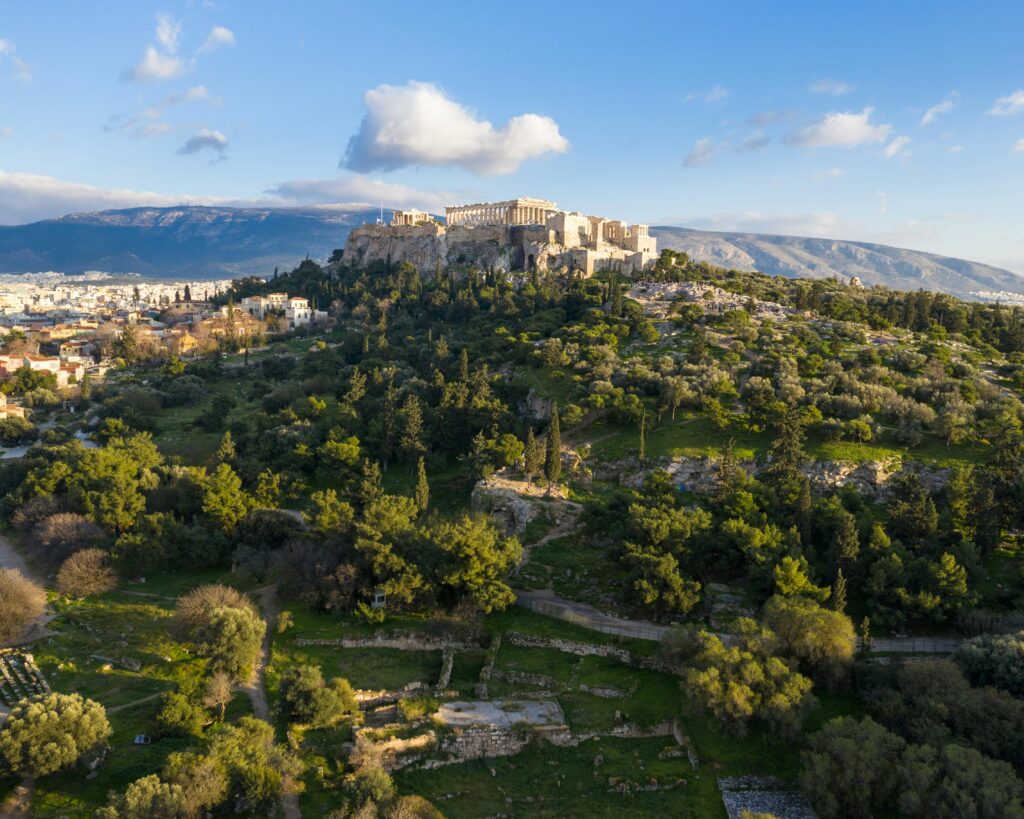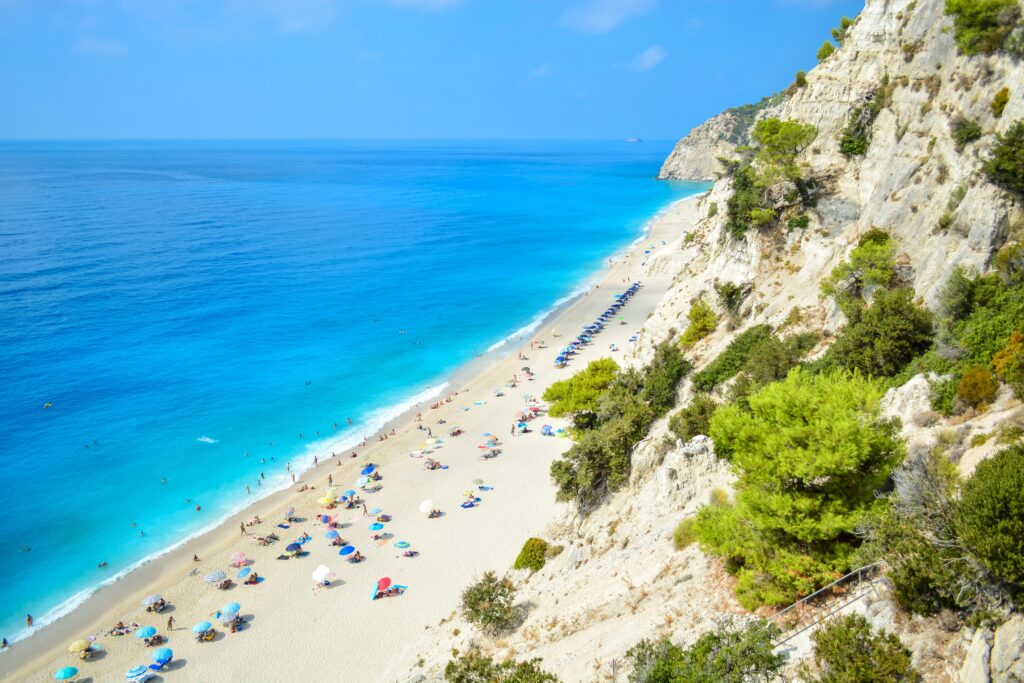Greece, with its sun-soaked islands, ancient ruins, and vibrant culture, is a year-round destination that offers something unique in every season. The best time to visit depends on what you’re looking for—whether it’s perfect beach weather, lively festivals, or a more peaceful experience away from the tourist crowds. Here’s a brief overview of Greece’s different seasons, highlighting the best times to visit based on weather, events, and tourist flow, along with some personal anecdotes to bring these experiences to life.
Spring (March to May)
Spring is often considered the ideal time to visit Greece. The weather is mild, with temperatures ranging from 15°C to 25°C (59°F to 77°F), making it perfect for sightseeing, hiking, and exploring ancient sites without the intense heat of summer. The countryside is in full bloom, with wildflowers dotting the landscape, providing a beautiful backdrop for photography and outdoor activities.

Personal Anecdote: One spring, I found myself in the Peloponnese during Greek Easter. I was invited by a local family to join their Easter celebrations in a small village near Nafplio. It was unlike any Easter I had ever experienced. The whole community gathered for a midnight church service, followed by a feast that lasted well into the early morning hours. I remember the taste of spit-roasted lamb and the sound of traditional Greek music filling the air. What struck me most was the warmth and generosity of the people; even though I was a stranger, they treated me like family. The experience was so heartwarming that I felt like I truly understood the spirit of Greek hospitality.
Summer (June to August)
Summer is the most popular time to visit Greece, especially for those looking to experience its iconic beaches and island life. Temperatures can soar up to 35°C (95°F) or higher, particularly in July and August, making it perfect for swimming, sunbathing, and water sports. The Aegean and Ionian islands, such as Mykonos, Santorini, Crete, and Corfu, are buzzing with activity. Beach bars, nightclubs, and outdoor concerts are in full swing, offering a vibrant nightlife for those who enjoy partying and socializing.

Personal Anecdote: I once spent a summer on the island of Paros, a lesser-known gem in the Cyclades. During one scorching day in July, I decided to escape the heat by taking a boat trip to a secluded beach called Kolymbithres. The beach, with its unique rock formations and crystal-clear waters, was almost deserted except for a few locals. As I swam and floated in the warm, turquoise sea, a fisherman pulled up his boat nearby. He started grilling freshly caught fish on a small portable grill right there on the beach. Before I knew it, I was sharing a meal of grilled octopus and ouzo with him and a couple of other travelers who had wandered over. That spontaneous beach picnic became one of my fondest memories of Greece—an unexpected moment of connection and joy.
Autumn (September to November)
Autumn is another fantastic time to visit Greece, often described as a second spring. The temperatures cool down to a comfortable range of 20°C to 28°C (68°F to 82°F), and the sea remains warm enough for swimming well into October. This season is ideal for enjoying the beaches without the summer crowds and exploring archaeological sites in more pleasant conditions.

Personal Anecdote: During an autumn trip to Crete, I stumbled upon a local grape harvest festival in a village outside Heraklion. I was invited to join in the festivities, which included grape stomping—a process that is both fun and messy! I’ll never forget the sensation of squishing grapes underfoot or the laughter that erupted every time someone slipped. The village women taught us how to dance the traditional Sirtaki, and I ended up dancing with an elderly woman who, despite her age, outlasted everyone else on the dance floor. By the end of the night, I felt as if I had become a part of the community. The warmth of the people and the joy of the harvest season made it a magical experience.
Winter (December to February)
While winter is the off-season for most of Greece’s famous beach destinations, it offers a completely different experience that can be equally rewarding. Mainland Greece, particularly the regions of Northern Greece and the Peloponnese, offers great winter activities, including skiing in places like Mount Parnassus or hiking in the snow-covered landscapes of the Zagori villages.

Personal Anecdote: One winter, I decided to explore a different side of Greece and headed to the mountainous region of Zagori in Epirus. The plan was to hike the famous Vikos Gorge, but a sudden snowfall transformed the landscape into a winter wonderland. Though my original plans were thwarted, the villagers were quick to invite me into a local taverna, where a roaring fire and a pot of hot tsipouro (a local spirit) were waiting. The owner, an elderly man with a twinkle in his eye, shared stories of the region’s history and his adventures as a young shepherd. That snowy evening, surrounded by friendly strangers, I realized that Greece’s magic isn’t just in its summer sun but also in its ability to surprise and embrace you in the most unexpected ways.
So when should I visit Greece?
Ultimately, the best time to visit Greece depends on what you’re hoping to experience. Summer is often the most popular choice, as it offers a bit of everything: long days, beautiful blue skies, warm temperatures, and plenty of light for photos. The warm weather allows for comfortable clothing like t-shirts, shorts, skirts, and bikinis. While the summer heat can be intense, most visitors expect it and embrace it, finding that the warmth and energy of the season make up for it. Summer in Greece feels alive and vibrant, whereas winter, especially in the cities, can feel a bit gloomy. Foggy or slushy winter days don’t always pair well with urban settings, though Greece’s nature is beautiful year-round.
Spring and autumn, however, can also be incredibly picturesque. If it’s your first time visiting Greece and you’re flexible with your travel dates, consider the months (or weeks) just before or after peak summer season. During late spring or early autumn, you’ll enjoy long days, pleasant weather, and enough visitors to create a lively atmosphere without the heavy crowds. These seasons also bring beautiful landscapes as wildflowers bloom in spring and golden hues warm the countryside in autumn.
Winter, on the other hand, is for travelers who specifically seek a quieter, cooler side of Greece. While it can be breathtaking, it may not be everyone’s preference. So, ask yourself—what kind of experience are you looking for?
- For those wanting warm weather and lively beach parties, summer is clearly unbeatable.
- For a mix of pleasant weather, blooming landscapes, and cultural experiences, spring and autumn are ideal.
- And for a unique, quieter experience with the opportunity for winter sports, winter is perfect.
No matter when you visit, Greece promises a memorable experience filled with beauty, history, warm hospitality, and those unexpected moments that stay with you long after you’ve left. Whether you come in summer, winter, or any time in between, the magic of Greece is yours to discover—so make the most of it!
